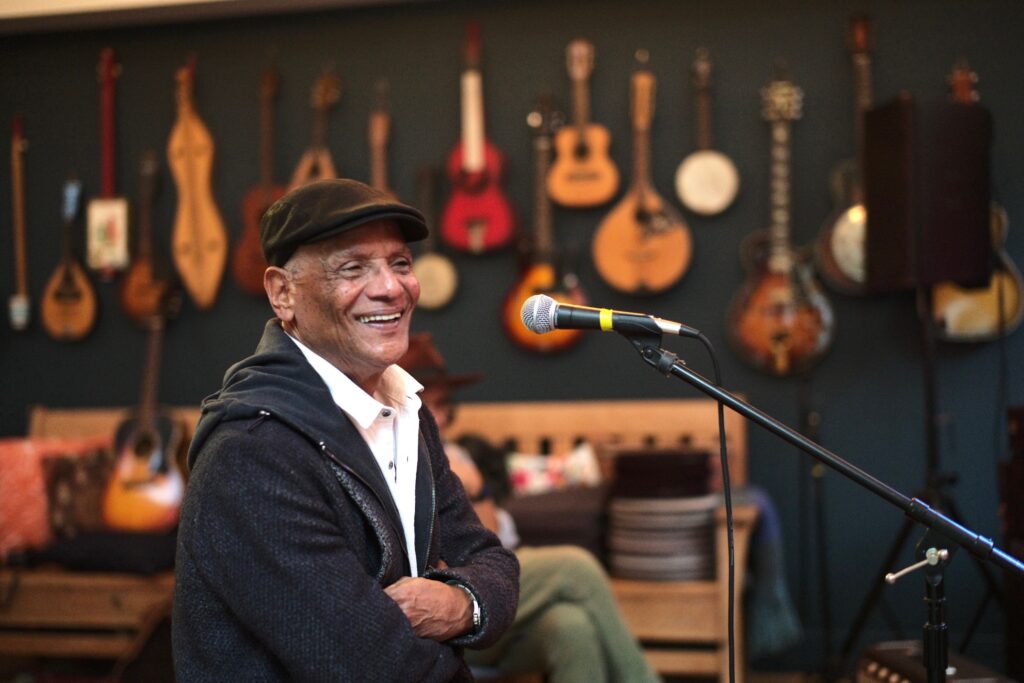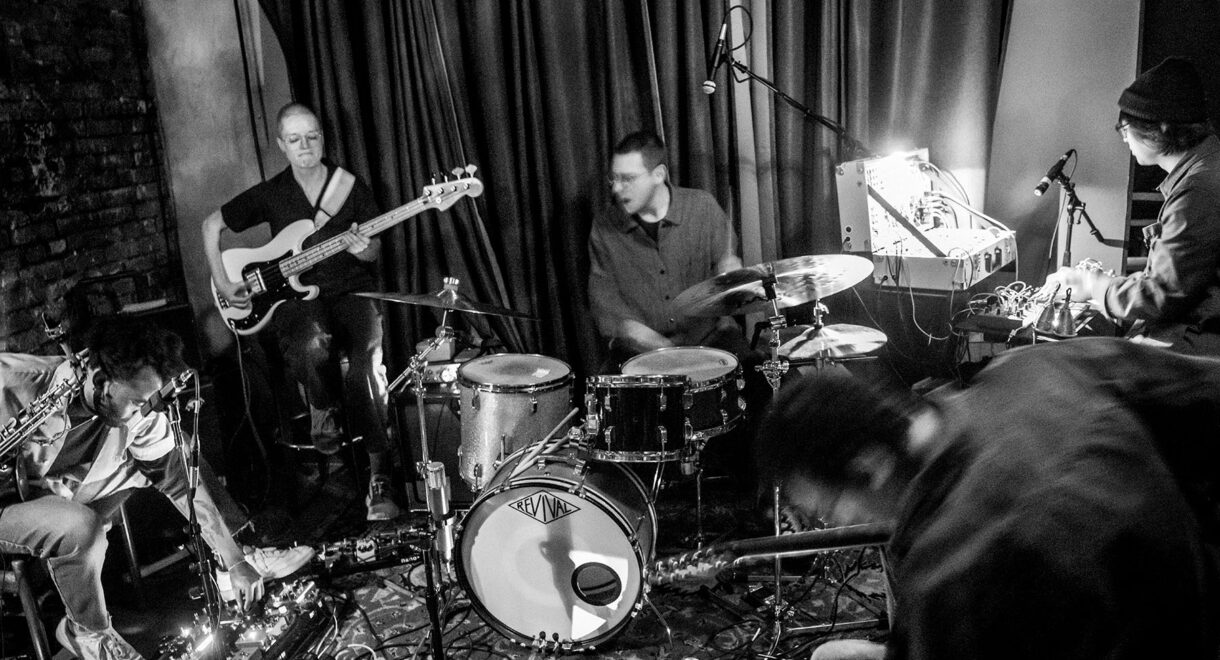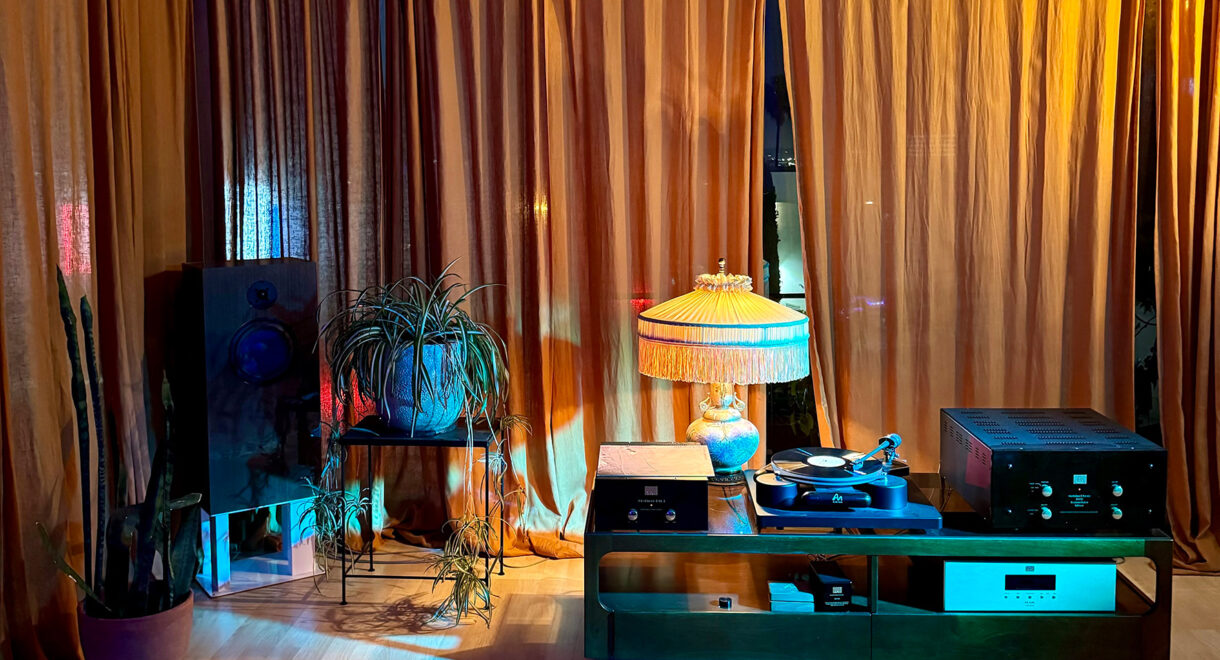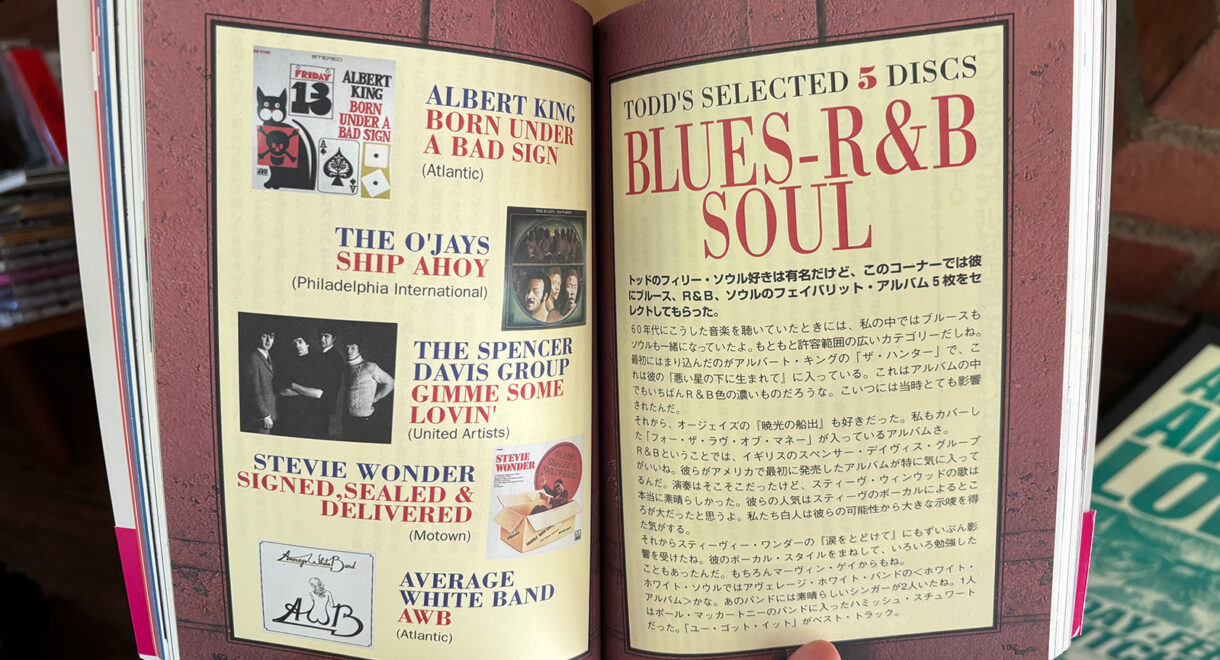“Dubwise but not exactly dub, rich in ambience but not exactly ambient music.” With three of the classic Sade albums (Promise, Diamond Life, Stronger Than Pride) recently repressed […]
In Conversation: Flying Dutchman’s Protest Soul with Billy Valentine and The Universal Truth

The Revolution Will Not Be Televised. A Chance For Peace. Soul And Soledad. The Universal Truth.
Today marks the historic return of one of our all-time favorite independent jazz labels. Flying Dutchman, home to seminal albums by Gil Scott-Heron, Angela Davis, Gato Barbieri, Horace Tapscott, Leon Thomas, and Lonnie Liston Smith, has relaunched after nearly 40 years with a new album from veteran singer and songwriter Billy Valentine. The Universal Truth draws upon the soul-jazz legacy of the Flying Dutchman catalog, delivering modern renditions of iconic protest songs from Gil-Scott Heron, Leon Thomas, Marvin Gaye, Eddie Kendricks, Curtis Mayfield, Prince, War & Stevie Wonder.
Flying Dutchman’s storied history and musical output has always been informed by periods of deep cultural upheaval. Founded in 1969 by visionary producer Bob Thiele when counterculture and black power were in full swing, the label released some of the most forward-thinking music of the era, combining spiritual jazz and protest soul with experimentation and black politics. Notably, some of the earliest releases on the label were spoken word albums of political speeches by left-wing figures like Angela Davis and America’s first black leader of a major city, Cleveland mayor Carl Stokes.

The relaunched label’s first signing, Billy Valentine, recalls witnessing the civil rights protests through the Deep South in the United States, the Kent State University shootings in 1970, and the Vietnam War and its devastating aftermath. His earliest songs include the R&B hit “Money’s Too Tight (To Mention)” with his brother as the Valentine Brothers, which drew on the duo’s personal struggles with employment in the late ‘70s. The Universal Truth continues Valentine’s lifelong connection to protest songs. “The music on my album speaks to me,” Valentine says, “I think this is the most important music that I’ve done yet in my life.”
With Flying Dutchman’s return in 2023, producer Bob Thiele Jr. – the son of Flying Dutchman Records’ founder, Bob Thiele – writes that “our times bear more than a passing similarity” to the early years of the label with COVID, #BlackLivesMatter and systematic racism across the board.
Billy Valentine and The Universal Truth features a stellar cast of musicians, including tenor saxophonist Immanuel Wilkins, trumpeter Theo Croker, bassist Linda May Han Oh, guitarist Jeff Parker, vibraphonist Joel Ross, percussionist Alex Acuña, pianist/keyboardist Larry Goldings, bassist Pino Palladino, and drummer James Gadson, among others.
In Sheep’s Clothing’s Phil Cho spoke with Billy Valentine to learn more about his musical background, developing as an artist, The Valentine Brothers, songwriting with Bob Thiele Jr., and more.
Hey Billy! To start... It seems music has been a part of your life since the very beginning. What are your earliest musical memories? Who were your early musical influences?
My older brother, Alvin Valentine, was who I remember first listening to. Growing up, I would watch him perform and put his soul on the line. He played B3 Hammond Organ and sang. He had one of the most beautiful voices, so I didn’t have to look far for greatness. He was kind of a Ray Charles type of guy. He loved Ray Charles, and he turned me on to him. So Ray Charles became a big part of who I was as a youngster at 14 or 15 years old. I’m from a big family of 13 children – seven girls and six boys– and music was always around the house. There was always a piano around. I started singing on stage from as early as seven or eight when I did it in the school talent show. I can say that I found my passion early.
I’d love to know more about Club Faces, the club that your family ran. It sounds like a very unique way to grow up and experience the entertainment / music industry first hand.
We had our own club in Columbus, Ohio. My parents would greet you at the door, my sisters ran the bar, and my brothers and I ran the bandstand. It became very popular. We did very well. We were doing that, and then I went on the road for a little bit with a group called Young Holt Trio. Isaac “Redd” Holt and Eldee Young, they were two-thirds of the Ramsey Lewis Trio. Once I auditioned for them, they took me on and we became Young Holt Unlimited. It was “Redd” Holt, Eldee Young, Bobby Lyle and myself, Billy Valentine. That was a real learning period for me. During my teen years, when I was out of school, my brother would take me with him to New Jersey. So I got to see a lot of great performers when I was very young.

Was this around the time when you performed at Leon’s Cocktail Lounge? I read you opened for people like Donny Hathaway and Roberta Flack.
Yes, Leon’s Cocktail Lounge was in Hackensack, New Jersey. A lot of the opening acts at the Apollo would come over to Leon’s and headline, and I would be the opening act for them. People like Judy Clay, Etta Jones, Willie Hightower. These were working entertainers. Judy Clay was one of the cousins of Dionne Warwick. She sang with the Sweet Inspirations and she was sort of like a Jennifer Holiday type. I got to witness all this at a very young age. At 15, I probably didn’t know but three or four songs, but I got to watch these people. I got to experience the spell they put on the audience and the way they touched an audience. It felt very church-like. I adopted that style of going out into the audience and actually touching my audience. It becomes that kind of thing as a performer. I’m sure James Brown did it. Everybody did it back in the day. That’s just how you gave your all and put it all on the line.
That was a fantastic learning period. That was like going to college. I was a sponge. I saw Willie Hightower, who was the spitting image of Sam Cooke. Sam had just been killed a year and a half before. I saw the spell Willie had on the audience and people were just falling out of their chairs the way he was laying it down. I said, “Wow, how can somebody have that kind of effect on somebody?”
I imagine you’re sort of building your repertoire at this point, and expanding on your skills as a singer and artist.
Absolutely. I wasn’t far from that anyway because I was studying Ray Charles. If you’re studying Ray Charles, you’re learning how to tap into your soul. You’re learning how to be an interpreter, you’re learning how to be a messenger. I remember seeing what Judy Clay would do to an audience. She was a big lady, looked like she was straight out of church. When she laid it down, she would cry, she would sweat. It was amazing to watch.
You mentioned their performances felt very church-like. Was church and gospel music a part of your early life growing up?
In my younger days, I was in the church quite a bit, but I never considered myself a gospel singer. I didn’t learn how to sing in the church. Quite frankly, I was scared out of the church from a lady who had had an epileptic fit. She made this siren sound and everybody got up and rushed out of the church. I was a little boy, and it just frightened me so much. I think I missed out on something by not being the gospel singer, but I made up for it in other ways.
Do you remember some of the songs that you were performing during this time?
“Drown In My Own Tears,” was one of Ray’s songs. I started singing “Georgia.” I was doing a lot of Otis Redding. “Try A Little Tenderness.” I was doing his up tempo stuff. I learned to be a soul singer from studying Otis. I was so into Otis, man. It just bummed me out so bad when Otis went down in the plane. I studied him very closely. “I Can’t Turn You Loose.” He bared his soul like no other.
You see the world for what it is, and you start to put those things together in your mind. It also opened up my mind that perhaps I’m a messenger and that is my gift in life.
Starting from the late ‘70s you and your brother John later released music as The Valentine Brothers. Many of those albums are now rare groove / Quiet Storm classics. How did that chapter of your story begin?
When I left Columbus to go to California, my brother came with me. That’s when we became the Valentine Brothers. We came to California in the ‘70s to make some records, but within three months, we got sidetracked and found ourselves in the Wiz, the musical with the national touring company. They hired us and we became the orchestra voices along with two ladies. So we’re out of town for three years, just traveling around the country. During this time, we were actually able to make a first album called The Sound of Music. We did the song “The Sound of Music” as a disco version. We were also able to include a couple of our own songs on there. “Let Me Be the One” was one of them. It wasn’t until after the Wiz stopped that we got seriously into our next album. When we got home, we found ourselves out of work. So my brother came up with this title for a song called “Money’s Too Tight (To Mention)” because we had just gotten laid off. He incorporated all of that into the song. Once we got back off the road and got focused on really making records here in the L.A. area, that’s when our writing started to come together.
I especially love the album 'First Take,' featuring co-production from Bobby Lyle.
That record was on an independent label, Bridge Records. When we started off, it was John, Bobby Lyle, myself, and a drum machine. That’s how that album started. We just had these ideas that we’d taken over to Bobby’s and we found a little groove on them. Things just started to happen in the studio. It was a beautiful thing.
We used a DMX or something like that. Cool. We were over at Lion’s Share, which was owned by Kenny Rogers at the time. They had a great engineer, Reggie Dozier, who did a lot of the Marvin Gaye records, as well. It was the early ‘80s, so Reaganomics was in play. Everything was in play at that time. There were so many things happening. Cuts to welfare, cuts to everything… We were just writing about what we knew about.
“Money’s Too Tight (To Mention)” touches on some socio-political themes. Do you feel a connection to your work then to what you do now?
Yeah, we were growing up and starting to see the world for what it was. You can’t see it any plainer than when you’re at your lowest, when you’re toughing it out. You see the world for what it is, and you start to put those things together in your mind. It also opened up my mind that perhaps I’m a messenger and that is my gift in life – that I am delivering a message from a higher authority or something, I don’t know. But it’s carried over in my life. I felt like, okay, I can use my voice for something. As long as I’m using it for good, it’s for something. You know what I mean? I’ve written other songs, and they all have social connotations to them. I got one song called “I’ve Seen Enough to Know.” I can only write about what I know about.
How did you and Bob Thiele Jr. first meet and link up?
John and I started drifting. I was always looking to write with not just John, but also other people. I wanted to expand so that when John and I would do a follow up record we would have plenty of material to choose from. It didn’t have to all be our stuff. I wasn’t that confident, maybe, about our writing at the time. When we started drifting, I was introduced to Bob Thiele over at A&M, which is where John and I were assigned. Bob and I just started kicking around any kind of ideas we had and then we started writing. I started singing some of his songs that he would write with other people. Then he got a publishing deal at Warner Chappell, and I was singing not just our demos, but all of his demos, and then I began singing all of the other writers’ demos. So I became the guy over at Warner Chappell, Famous Music, and all these publishing houses. I’m a demo singer, basically, and that was a school.
That was another schooling because you didn’t have a whole lot of time to go in there and find yourself in a song. You get to hear it a couple of times, and then you have to sing it. That was a good technique to learn, to be able to feel it on the spot, not just sing it, but bring it from down into your gut. Those were really helpful years for me because I sang songs that I never would have sung, pop songs, some from Bonnie Raitt, Michael Bolton, Al Green, and all these people were cutting. That was a great lesson for me.
Let me not forget that during that period, Bob and I were writing our own songs that were being recorded by the Neville Brothers, Pops and Mavis Staples, and others. Then my hero Ray Charles records one of our songs, “My World.” That’s when I thought, “Okay, there’s something here. I’m not just another passing thing. Something’s going on.” It was a glorious moment for me that Ray would record our song, and then it became the title of the album. That whole social commentary thing, I give Ray all the credit for that, showing me how to deliver a song.

You’ve been collaborating with Bob for years now on songwriting projects. When did the idea to relaunch Flying Dutchman with a new album come together?
Bob wanted to do a record with me. I always kind of felt that. Then during COVID, the whole isolation process, George Floyd, Black Lives Matter and all the political things that were going on at the time, Bob came to me and said he wanted to relaunch his father’s label, Flying Dutchman, and that he wanted me to be the first artist on the label.
Well, I was honored that my friend of 40 years wanted me to be the first artist on his label. He also told me he wanted to do songs from the label, which were Gil Scott-Heron’s “Home Is Where the Hatred Is” and Leon Thomas’ “The Creator Has a Master Plan.” Those were the first two that he brought to me. I said, “Wow, this is heavy duty. Yeah, this is really something.” Then he came back with Curtis Mayfield’s “We People Who Are Darker Than Blue.” Well, at that point, I thought that this is not just a record. You got something to say. You really have something to say here… I got into it, man, because I’m in isolation and seeing all the shit that’s going down with George Floyd being killed on television right before your eyes, Black Lives Matter, and the president down in the streets inciting violence. It was a scary time.
I guess it became the perfect storm because Bob brought in the right cats. Larry Golding, Pino Palladino, Jeff Parker, James Gadson… He brought in the whole crew, man. We went to the East West studio and it was the perfect time, the perfect storm. I was into the songs by that time. I had been studying the whole package of songs that we chose. When we got into the studio, I was emotionally ready for this. We started to come together as a family, the musicians and I, and it happened very quickly because Bob gave us the space. It was loose, and we could be as creative as we wanted to be without overindulging, for lack of a better word. But everybody was so cool, man. Everybody was so in tune with each other. Everybody’s ears were so huge. We were listening to each other and we were tripping off of each other.
It was a very cathartic thing for me because it was a dark period and the songs were dark. Once I was done, I really didn’t want to hear it for a while. I could not listen to it because that’s just who I am. I’m very hard on myself as a recording artist. I’m supposed to be really superb when it comes to the studio. I just feel like I’ve been at it a while, but I knew I was singing differently on this record than I have before. The weight I was able to express myself on this record was like never before. I was able to express myself with “Money’s Too Tight,” my need was right up front in that song as well. But I don’t know. All eight of these songs were very gut-wrenching. Once I really started listening to it,I was very surprised and happy with the result.
It was good to be with people on the same level, on the same wavelength. Boy, I was just able to be as open as I wanted to be and sing about this stuff because it was happening. It was the ‘60s all over again for me. It was the Vietnam War. It was Kent State all over again because that’s when I first heard these songs, back in the ‘60s.
It feels like you’ve found a new voice or new stage in your artistry with this project.
That’s the reason why I said that this feels like my real debut. Quite frankly, it’s wonderful to be a part of the conversation of singers that can possibly make a mark on something. It’s hard to be a part of that conversation, but it’s so gratifying that at this time in my life I have a record on the radio. I haven’t been on the radio in a while. This makes it even much more of a perfect storm for me. I’m back there again and it was like this voice was supposed to be heard again. This is like being rebirthed.
Your album features new interpretations of iconic songs from Gil Scott-Heron, Curtis Mayfield, Prince, War, and others. They sound amazing and you've put your own touch on each of these versions. What was your process when approaching these classics?
On this record, the words, melodies, and songs just felt right. Sometimes it feels like the bed that you’ve been sleeping in. It’s just so comfortable. For example, “Home is Where the Hatred Is.” I felt like I’ve lived that experience. I’ve never been hooked on heroin or anything like that, but I’ve seen enough to know about that. I’ve known people who were hooked on heroin, and I was able to feel that pain. If you listen, you’ll feel my pain. You might even think I was on heroin. That’s the way I approach it, to completely put myself into that.
Actors do it all the time. Become the song, to become it. Let it engulf you and see what you can bring out of that. What can you bring to that party? Yeah, I got to bring something to that party, man, because these songs were such huge statements by such huge people. Esther Phillips did that song, and she and Gil had both lived through heroin addiction. I can’t play around with that. I got to be able to put something on that.
I love your take on Leon Thomas and Pharoah Sanders' spiritual jazz classic “The Creator.” You do the Leon Thomas yodel in one part of that song… Was that a new technique for you?
It’s a new technique, but I didn’t have to practice that very much. I was paying homage to Leon and it just felt right. “The Creator,” for me, it’s a jazzier side of Billy Valentine. I had to hold some notes out and use my entire register. That’s what I love about Bob Thiele. He will not let you stay in your comfort zone. He’ll push you out of your comfort zone and make you stretch. I was able to do that, especially with “The Creator.” I was able to do that with “We People Who Are Darker Than Blue.” But “The Creator,” to me, that’s like legit singing. I mean, I don’t know if that’s the proper way of putting it.
Your voice has an almost feather-like, kind of soaring quality to it on this track.
I’m glad you put it that way. That’s a great way of putting it. That’s exactly what it is. I had to take control of myself and kind of tame myself in order to allow that experience to happen. I knew I could sing, but can you sing this song here that says so much, and can you dramatize that in your voice? That became the challenge for me. I had to be a bit more disciplined and step outside of that soul thing. Step outside of that R&B thing a bit. It’s harder to hold a note than it is to run. You have to have control of your voice, your instrument. I learned a lot about my voice and my singing. I’m still growing. I’m still having fun.
What’s next for Billy Valentine & the Universal Truth?
Keep telling the truth. Continue to tell the truth. It’s really about being honest with yourself inside. I think there’s something else to be said. Not quite sure what yet, but there’s much more to be said, especially in our world today.











